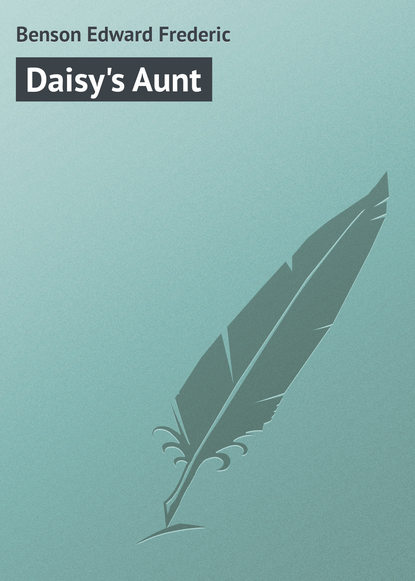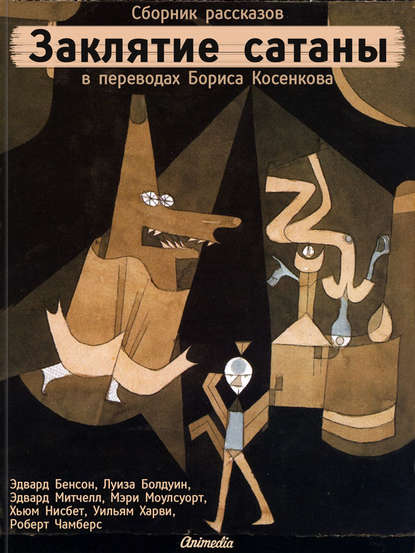
Полная версия
Daisy's Aunt

Edward Frederic Benson
Daisy's Aunt
CHAPTER I
Daisy Hanbury poked her parasol between the bars of the cage, with the amiable intention of scratching the tiger's back. The tiger could not be expected to know this all by himself, and so he savagely bit the end of it off, with diabolical snarlings. Daisy turned to her cousin with a glow of sympathetic pleasure.
"What a darling!" she said. "He didn't understand, you see, and was perfectly furious. And it cost pounds and pounds, and I've spent all my allowance, and so I can't buy another, and my complexion will go to the dogs. Let's go there, too; the dingoes are absolutely fascinating. We'll come back to see these angels fed."
Gladys laughed.
"Daisy, you have got the most admirable temper," she said. "I should have called that brute any names except 'darling' and 'angel.'"
"I know you would, because you don't understand either it or me. I understand both perfectly. You see, you don't love fierce wild things – things that are wicked and angry, and, above all, natural. I don't mind good, sweet, gentle things, like – oh, like almost everybody, if only they are sweet and good naturally. But generally they are not. Their sweetness is the result of education or morality, or something tedious, not the result of their natures, of themselves. Oh, I know all about it! Gladys, this parasol is beyond hope. Let's conceal it in the bushes like a corpse."
Daisy looked round with a wild and suspicious eye.
"There's a policeman," she said. "I'm sure he'll think that I have murdered my own parasol. Oh, kind Mr. Policeman – there, that softened him, and he's looking the other way."
Gladys gave a little shriek of dismay as Daisy thrust her parasol into a laurustinus.
"Oh! but the handle, and the ribs!" she cried. "It only wanted a new point, and – and to be recovered. Daisy, I never saw such extravagance. You mustn't leave it. I'll have it done up for you."
"That's angelic of you," said Daisy; "but will you carry it for me in the meantime? It's that that matters. I couldn't be seen going about even at the Zoo with a parasol in that condition. I should have to explain to everybody exactly how it happened, which would take time."
"But of course I'll carry it for you," said Gladys.
Daisy considered this noble offer.
"It's quite too wonderful of you," she said, "but I don't think I could be seen with you if you were carrying it. No; come to the dogs. Oh, Gladys, you are sweet and good and gentle quite, quite naturally, and I adore you."
The dingoes were rewarding, and Daisy instantly curried favour with their keeper, and learnt about their entrancing habits; afterwards the two went back to see the lions fed before leaving. The tiger which had ruined her parasol proved to have the most excellent appetite, which much relieved Daisy's mind, as she feared that the point, which he seemed to have completely eaten, might have spoilt his dinner. She hurried breathlessly down the line as the huge chops of raw meat were passed in and snatched up by the animals, absorbed and radiant. Gladys, as always, followed where the other led, but was conscious of qualms. These she concealed as best she could.
"Oh, I want to say grace for them all," said Daisy at the end. "I do hope they are pleased with their dinners. Are the keepers fair, do you think? There was a dreadful amount of bone in my parasol-tiger's dinner, if you understand. Gladys, I don't believe you loved it. How stupid of you! You don't quite understand; you don't know how nice it is to be greedy instead of gentle. Do try. Oh, no, let's go out by this gate."
"But we shall have to walk miles before we get a cab," said Gladys.
"I know; that's why. It will make us late for Aunt Alice's tea-party. I hate tea-parties."
"But mother asked me to be back by five," said Gladys.
"Did she? Did she really?" asked Daisy.
"Indeed she did."
"Oh, well, then of course we'll drive back, though I did want to walk. But it can't possibly be helped. We must drive. It is such a pity not to do as you are asked. I always do, except when Willie asks me to marry him."
They got into their hansom and bowled silently down the dry grey road. All June was in flower in the pink pyramids of the chestnut-trees, and was already beginning to bleach the colour out of the long coarse grass in the open spaces of the Park. There swarms of girls and boys rioted ecstatically; here the more lucky, in possession of a battered bat and a ball begrimed with much honourable usage, had set up three crooked sticks to serve as wickets, and played with an enthusiasm that the conditions of the game might justly have rendered difficult of achievement. The one thing certain about the ball was that it would not come off the baked, uneven ground at the angle at which it might be expected. It might shoot, or on pitching might tower like a partridge, and any ball pitched off the wicket might easily take it; the only thing quite certain was that a straight ball (unless a full pitch) would not. Above, the thick dusky blue of a fine summer day in London formed a cloudless dome, where the sun still swung high on its westering course. In front of the distances that dusky pall was visible, and the houses at the edge of the Park were blurred in outline and made beautiful by the inimitable dinginess of the city.
But Gladys had no eye for all this; she was burning to know what was the latest development in the Willie affair, but her whole-hearted affection for her cousin was a little touched by timidity, and she did not quite like to question her. For Daisy, in spite of her charm, was a little formidable at times; at times she would have moods of entrancing tenderness; she could comfort or appeal, just as she could take the most sympathetic pleasure in the fact that a fierce tiger was annoyed at her amiable intentions, and had spoilt her best parasol. But at other times there was something of the tiger in her – that, no doubt, was why she understood this one so well – which made Gladys a little shy of her. She had often, so to speak, bitten off the end of her cousin's parasol before now, and Gladys did not appreciate that as much as Daisy had just done. So in silence she looked a little sideways at that brilliant, vivid face, flushed with the swift blood of its twenty-two years, that looked so eagerly from its dark grey eyes on to the activity of the playing children. But silences were generally short when Daisy was present, and she proceeded to unfold herself with rapidity and all the naturalness of which she deplored the lack in the gentle, good people.
"Oh! how they are enjoying themselves," she said, "with really no material at all. Gladys, think what a lot of material a person like me wants to make her enjoy herself! It really is shocking. My gracious, what an ugly child that is! Don't look at it; you never should look at ugly things – it's bad for the soul. Yes, I want such a lot to make me happy – all there is, in fact – and poor darling Willie hasn't got all there is. He's the sort of man I should like to marry when I am forty-three. Do you know what I mean? He would be quite charming if one were forty-three. He's quite charming now, if it comes to that, and I'm dreadfully fond of him, but he thinks about me too much; he's too devoted. I hear his devotion going on tick, tick, all the time, like the best clocks. That's one reason for not marrying him."
"I don't think it's a good one, though," remarked Gladys.
"Yes, it is. Because a man always expects from his wife what he gives her. He would be absolutely happy living with me on a desert island; but – I know it's true – he would tacitly require that I should be absolutely happy living with him on a desert island. Well, I shouldn't – I shouldn't – I shouldn't. I should not! Is that clear?"
"Quite."
"Very well, then, why did you say it wasn't? Oh, yes, I know I am right. And he would always see that I was well wrapped up, and wonder whether I wasn't a little pale. I can't bear that sort of thing. No doubt it's one way of love; but I must say I prefer another. I daresay the love that is founded on esteem and respect and affection is a very excellent thing, but it's one of those excellent things which I am quite willing to let other people have and enjoy. It's like – like Dresden china; I am sure it is quite beautiful, but I don't want any myself. I wish you would marry Willie yourself, darling. Don't mind me."
They rattled out over the cobblestones of the gate into Baker Street, and plunged into the roaring traffic. Daisy had still a great deal to say, and she raised her voice to make it heard above the intolerable clatter of motor 'buses and the clip-clop of horses' hoofs.
"Besides, as I said, I want such a lot of things. I'm hard and worldly and disgusting; but so it is. I want to be right at the top of the tree, and if I married Willie I should just be Mrs. Carton, with that decaying old place in Somerset; very nice and intensely respectable, but that's all. It's quite a good thing to be nice and respectable, but it's rather a vegetable thing to be, if you are nothing else. I must be an animal at least, and that's why I'm playing 'Animal Grab.'"
Gladys looked – as was indeed the case – as if she did not quite understand this surprising statement.
"I'm very slow, I know," she said, "but – "
"Yes, darling, you are, but you do know what I mean, though you don't know you know it. I've often seen you wondering about it. Oh, that motor 'bus is going to run into us! It isn't; how can you be so nervous? It cleared us by at least a quarter of an inch. Yes, 'Animal Grab.' Now 'yes' or 'no,' do you know what I mean, or don't you?"
Gladys trembled under these direct assaults. But she thought "yes" was more likely to be favourably received than "no," and so allowed herself to say "yes."
But it proved to be a vain hope that Daisy would thereupon go on and explain. That was so like Daisy; she never did what you hoped or expected she might. Gladys on this occasion, with her pink, timorous face and general air of discouragement, prayed that Daisy might not trouble about her, but just go on talking. It is true that Daisy did talk next, but, instead of expounding, she rapped out a question.
"So you do know," she said. "Then what is it?"
Gladys shut her eyes for a moment to encourage bravery.
"I suppose it means that you are thinking whether you will marry Lord Lindfield or not," she said.
Daisy, however peremptory, was not a bully.
"How did you guess that, dear?" she asked.
"It wasn't very difficult. It couldn't have been, you see, or I shouldn't have guessed it. But he has been – well, a good deal interested in you, hasn't he, and you – "
"Do you mean I've encouraged him?" asked Daisy, with an inquisitorial air.
"No, I mean just the opposite. You've rather snubbed him." Gladys made a huge demand on her courage. "But you've snubbed him in such a way that it comes to the same thing as if you had encouraged him," she said.
Daisy considered this.
"I think you've got a horrid mind, Gladys," she said at length. "If I encourage somebody you tell me I am flirting, and if I discourage him you tell me it comes to the same thing. And you do me an injustice. I haven't snubbed or discouraged him. I've – I've remained neutral, until I could make up my mind. Do you think he cares for me? I really don't know whether he does or not. I can always tell with the gentle, good people like Willie, and it is gentle, good people whom I see most. Oh!"
Daisy gave a great sigh, and leant out over the folded door of the hansom.
"I'm not sure if I want to marry Lord Lindfield or not," she said, "but I'm perfectly certain that I don't want him to marry anybody else. I think I should like him always to remain wanting to marry me, while I didn't want to marry him. I'm dreadfully glad you think that I can snub or encourage him, because that means that you think he cares. I should be perfectly miserable if I thought he didn't."
"I don't think you need be miserable," said Gladys.
"I'm not. Oh, there's the Prime Minister; I shall bow. That was a failure. He looked at me like a fish. How rude the Cabinet makes people! The Cabinet always goes about with the British Empire pick-a-back. At least, it thinks the British Empire is pick-a-back. The Empire doesn't. About Lord Lindfield. He's turning grey over the temples, and I think that is so frightfully attractive. Of course, he's awfully old; he must be nearly forty. He's dining to-night, isn't he? Then I shall arrange the table. Yes, you needn't look like that. I shan't make him take me in. He's supposed to be wicked, too. Oh, Gladys, it is so nice if men go playing about, and then fall in love with me. It's worth heaps of the other kind. Oh, don't look shocked; it is silly to look shocked, and so easy."
The hansom waited for a moment at the junction of Orchard Street and Oxford Street, and the innumerable company of locomotives sped by it. Motors shot by with a whirr and a bubbling, hansoms jingled westwards, large slow vans made deliberate progress, delaying the traffic as some half-built dam impedes the course of flowing water till it finds a way round it, and through the streams of wheels and horses pedestrians scuttled in and out like bolted rabbits. The whole tide of movement was at its height, and the little islands in mid-street were crowded with folk who were cut off, it would seem, by the rising flood-water from all communication with the shore, with but remote chance of escape. Then an omnipotent policeman stepped out into the surging traffic, held up a compelling and resistless hand, and at his gesture the tides, more obedient to him than to Canute, ceased to flow, and the cross-movement began, which permitted Daisy and her cousin to cross the stream. But whether it was that the stoppage in their passage made a corresponding halt in her thoughts, or whether, as was more likely, she had said all that she meant to say on the subject of Lord Lindfield, she began, just as they started to move again, on something widely different.
"And Aunt Jeannie comes to-morrow," she said, "which is quite delightful. For I do believe I've missed her every single day since she went away a year ago. And if I do that, you may depend upon it that she is very nice indeed. As a rule, I like people very much when they are there, and I get along excellently without them when they are not."
"Quite – quite true," said Gladys, with a touch of acidity.
"It's much the most sensible plan," continued Daisy, perceiving, but completely ignoring, the tone. "It does no good to miss people, and, as I say, I seldom do it. But I always miss Aunt Jeannie. I should like to see her every day of my life. It would be dreadful to see most people every day, though I like them so much when I do see them. Oh, Gladys darling, don't look as if you were in church! You can't take things lightly, you know."
"And you can't take them in any other way," remarked Gladys.
"Oh, but I can; it is only that I don't usually choose to. It is a great blessing I don't take every one seriously. If I took Willie seriously, I should find him a great bore; as it is, I think he is quite charming, and I should certainly marry him if I were fifty."
"It was forty-three just now," said Gladys.
"Yes; but being with you has made me grow older very quickly," said Daisy.
Gladys laughed; with Daisy it was very true that "c'est le ton qui fait la musique," and the same words which in another tone could have wounded her, now merely amused. It had taken her a long time to get used, so to speak, to this brilliant, vivid friend, who turned such an engaging smile on the world in general, and shone with supreme impartiality on the wicked and the good, and to know her, as she knew her now, with greater thoroughness than she knew herself. Ethically, if Gladys had been put to the question on her oath, she would have had to give the most unsatisfactory account of her friend, and, to sum up all questions in one, it would have come to this – that she believed Daisy to be quite heartless. But, humanly, there was in Daisy much to take the place of that profound organ. She had the joy of life and the interest in life to a supreme degree, and though she resolutely turned her back on anything disagreeable or ugly, her peremptory dismissal of such things was more than made up for by her unbounded welcome of all that pleased her. You had only to please her (and she was very ready to be pleased), and she poured sunlight on you. And Gladys, who was naturally rather shy, rather slow to make friends, rather reticent, soon grasped this essential fact about Daisy, and having grasped it, held tightly to it. She felt she would not readily go to Daisy if she was in trouble, but there was no one to whom she would hurry with such certainty of welcome if she was happy. And though, no doubt, sympathy, to be complete, must feel for sorrow as keenly as it feels for joy, yet a nature that feels keenly for joy and turns its back on sorrow is perhaps quite as fine a one as that which, though it may be an excellent comforter, is rather of the nature of a wet blanket when a happy soul appeals to it for sympathy. And on joy, whether her own or that of another, Daisy never turned her back. She delighted in the happiness of others.
CHAPTER II
Daisy's father and mother had both died when she was quite young, and not yet half-way through the momentous teens. For seven years after that she had lived with her mother's sister, the inimitable Aunt Jeannie, whom she wished to see every day. But though she had passed seven years with her, she had barely seen her aunt's husband. It was his death, a year ago, that had sent her to the Nottinghams, for Aunt Jeannie in a crisis of nerves had been ordered abroad for a year, and was now on the point of return, and, having returned, was to stay with Lady Nottingham for the indefinite period which may be taken up by the finding of a suitable house.
Daisy knew there had been trouble at the back of all this. Uncle Francis, Aunt Jeannie's husband, had been called an invalid, and she gathered that his ill-health was something not to be openly alluded to. Morphia was connected with it, a "habit" was connected with it, and since this was somehow disagreeable, she had long ago so successfully banished it from her thoughts that her curiosity about it was a thing without existence. Certainly he made Aunt Jeannie very unhappy, but Aunt Jeannie, who was such a dear, and so young still – not more than thirty, for she was the youngest of a family of whom Daisy's mother was the eldest – had been always sedulous to hide disquietude from her niece. And it was entirely characteristic of Daisy to be grateful for having it all hid from her, and not even in thought to conjecture what it was all about. During this year of separation from Aunt Jeannie, in which, as she had said (and Daisy, with all her faults and limitations, was a George Washington for truth), she had missed her every day, she had always looked forward to her return, and, though she liked being with Lady Nottingham very much, knew that she would ultimately go back to the unrivalled other aunt again with the intensest satisfaction.
But of late the prospect of going back, or living with any aunt at all, had receded into at least a middle distance. There was no doubt in her own mind (though she liked the absence of doubt to be endorsed by her cousin) that Lord Lindfield had been extremely attentive to her for the last month or so. He had committed dreadful social crimes, such as throwing over an engagement already made and nearly due, when he found that she would be at some house to which he was subsequently invited. And somehow (that was the charm of him, or part or it), though he upset dinner-tables right and left, nobody really minded. Match-making London, which includes the larger part of that marriageable city, even when they were personally affronted and inconvenienced, smiled sympathetically when they heard what his movements on the night he ought to have dined with them had been. He did even worse than that; he had once, indeed, omitted to send the excuse of a subsequent engagement, and everybody had waited a quarter of an hour for him to put in a belated appearance. And when he did not his hostess had remarked that he must be "picking daisies," and the procession had gone dinner-wards with a widowed girl.
It turned out to be true, did this conjecture of the hostess. He had dined "quietly" that night at Lady Nottingham's, and had played "old maid" afterwards, as bridge was universally voted to be far too intellectual. And Daisy took huge pleasure in such facts as these, stealthily conveyed to her by one if not more of her innumerable girl friends. For though there was no doubt that many dutiful mothers would have liked their daughters to marry Lord Lindfield, yet when he declared himself by signs as unmistakable as this, they neither felt nor communicated any ill-humour.
He was picking daisies; very well, the sooner he plucked the particular one the better. Daisy was so pleasant; no wonder, after all, that he wished for her. And she too, quite soon, would join the ranks of the match-makers, and be immensely kind to everybody else. Yet if only Katie or Elsie or Nellie – But it was no use thinking about that. Daisy, once settled, would certainly do her best for those to whom fortune must pay a "subsequent" visit.
Lady Nottingham purred approval over the girls on their punctual return, before any of her guests had arrived. She was rather stout and very comfortable. Behind her stoutness and her comfort there beat a heart of gold, and an extremely acute brain, which was not always allowed for, was alert and watchful. A heart of gold is considered as not incompatible with comfort and stoutness, but nobody who had not come to grips with her, or been her ally in some affair that called for diplomacy or tact, knew how excessively efficient her brain was. She had, too, the supreme gift of only sending into action as much of it as was required to do the work, and never made elaborate plans when something simple would do as well.
All this combined to make not only a character that was lovable, but a friend whose wisdom might be depended on, and Daisy was eminently right in valuing her aunt's counsel and advice. She sought it, indeed, this evening, in the quiet half-hour that intervened between the departure of the tea-party guests and the time when it was necessary to dress for dinner.
Lady Nottingham was resting in her room when Daisy went to her, ostensibly (and quite truly) to get the list of those who were coming to dinner that night in order to arrange the table. But though she would have gone there in any case for that reason, another and far more essential one lay behind it. She wanted, indeed, to get her aunt's opinion on the point she had herself talked to Gladys about that afternoon, and sound her as to her opinion about Lord Lindfield.
The sorting of people to see who would take whom in to dinner, with abstracted frownings over the map of the table, seemed to Daisy an admirable accompaniment for disjointed questions, and one which would give her an adventitious advantage, since at any moment she could be absorbed in the task she was so kindly occupying herself with, and be silent over it, if a reply was in any way inconvenient.
This sort of diplomacy, though not exactly habitual with Daisy, seemed to her sufficiently acute and blinding, and she sat on the floor with a peerage, the list of the guests, a sheet of paper and a pencil, and began at once, while Lady Nottingham "rested" on the sofa against which Daisy leant her back.
"Oh, what nice people!" said Daisy. "Can't they all take me in? Willie Carton, Jimmie, Lord Lindfield, Mr. Braithwaite, and Lord Pately. Dear Willie! I suppose he ought to take me in. Do you mind whether you sit at the end of the table or in the middle of the middle, Aunt Alice? Middle of the middle always works out more easily. All right. Dear Willie!"
The diplomat, who is known to be a diplomat, is at once under a heavy handicap. Daisy was instantly detected, and Lady Nottingham, since there was no direct question to reply to, preserved silence. Then, after a sufficient pause, she asked, —
"Have you settled about Willie, dear?"
"Ye-es. It will be better if he takes Gladys in."
"Then he's settled for," said Lady Nottingham, turning over a page in her book.












